| Srl | Item |
| 1 |
ID:
093228
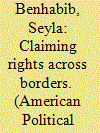

|
|
|
|
|
| Publication |
2009.
|
| Summary/Abstract |
The status of international law and transnational legal agreements with respect to the sovereignty claims of liberal democracies has become a highly contentious theoretical and political issue. Although recent European discussions focus on global constitutionalism, there is increasing reticence on the part of many that prospects of a world constitution are neither desirable nor salutary. This article more closely considers criticisms of these legal transformations by distinguishing the nationalist from democratic sovereigntiste positions, and both, from diagnoses that see the universalization of human rights norms either as the Trojan horse of a global empire or as neocolonialist intentions to assert imperial control over the world. These critics ignore "the jurisgenerativity of law." Although democratic sovereigntistes are wrong in minimizing how human rights norms improve democratic self-rule; global constitutionalists are also wrong in minimizing the extent to which cosmopolitan norms require local contextualization, interpretation, and vernacularization by self-governing peoples.
|
|
|
|
|
|
|
|
|
|
|
|
|
|
|
|
| 2 |
ID:
099104


|
|
|
|
|
| Publication |
2010.
|
| Summary/Abstract |
Do members of Congress put human rights concerns on the agenda in response to their constituents' demands for trade protection? Humanitarian concern may be an important motive, but the normative weight of these issues also makes them a potentially powerful tool for politicians with less elevated agendas. They may criticize the behavior of countries with whom their constituents must compete economically, while overlooking the actions of countries with which their constituents have more harmonious economic relations. This paper tests several hypotheses about the salience of human rights concerns in the politics of US foreign policy using data on congressional speeches during the late 1990s gathered from the Congressional Record. We find evidence that, while humanitarian interests remain an important motive for raising human rights issues, the economic interests of their constituents influence which members of Congress speak out on these questions, and the countries on which they focus their concern.
|
|
|
|
|
|
|
|
|
|
|
|
|
|
|
|
| 3 |
ID:
128859


|
|
|
|
|
| Publication |
2014.
|
| Summary/Abstract |
Does women's empowerment strengthen global good citizenship? We test theories of democratic foreign policy and feminist international relations that suggest that more deeply democratic countries with greater gender equity will be stronger international human rights promoters. First, the direct empowerment of women as policymakers and civil society constituencies may shift states' incentives and ability to pursue international human rights initiatives. Second, greater sexual equality may lead to feminist socialization of the wider society to promote human rights values. We test these predictions by measuring the relationship between five different measures of sexual equality and a country's propensity to support 30 international human rights outcomes, including legal commitments, humanitarian assistance, and sanctions, controlling for previously established contributing factors such as level of development and democratic regime type. We find that more sexually equal countries are more likely to support international commitments to constrain state violence against individuals, international measures to combat gender and sexual orientation discrimination, and more and higher quality development assistance. However, sexual equality appears to yield less benefit for more costly human rights initiatives: yielding sovereignty to international legal institutions, promoting economic rights through concessionary trade policies, or adopting diplomatic sanctions against pariah states. These effects are stronger in democratic states, where citizen empowerment translates more readily into foreign policy, and are also found in a sample that excludes the Western powers.
|
|
|
|
|
|
|
|
|
|
|
|
|
|
|
|
| 4 |
ID:
158062
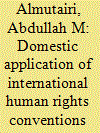

|
|
|
|
|
| Summary/Abstract |
This article examines the application of international human rights conventions in Saudi legislation where Sharia is the main source of law. Saudi laws often adopt the dualistic approach and its international human rights obligations must be in agreement with the Sharia. This paper further intends to explore the Kingdom of Saudi Arabia's (KSA) position on reservations and ratifications of international human rights conventions generally and in the context of migrant workers’ rights particularly. Since the KSA has not ratified any convention related to migrant worker protection, it is essential to examine the role of national human rights organisations in implementing and promoting human rights in the KSA and the article explores the significant efforts made by these organisations to implement and protect the rights of migrant workers in the country. It argues that the KSA has ratified a number of human rights conventions such as the International Convention on the Elimination of All Forms of Racial Discrimination; however, it has failed to comply with its provisions. It is suggested that non-discrimination provisions of some of these conventions may be used to advance migrants’ rights in the country.
|
|
|
|
|
|
|
|
|
|
|
|
|
|
|
|
| 5 |
ID:
088083


|
|
|
|
|
| Publication |
2009.
|
| Summary/Abstract |
This article analyzes the emergence of new human rights norms for transnational corporations. It first explores voluntary norm-making approaches, which have been a staple of this issue area since the 1970s. Second, it analyzes the formulation and eventual fall of the UN Draft Norms on the Responsibilities of Transnational Corporations and Other Business Enterprises with Regard to Human Rights. A final section reflects on the work of the UN special representative of the secretary-general on business and human rights, John Ruggie, and the future of norm making in this area. It is argued that these three processes constitute differing but fundamental steps toward the construction of international human rights norms for corporations and that, although norm entrepreneurs have clashed in debates over voluntary versus binding standards, norm making in this area remains healthy thanks to a now more solid international awareness regarding the corporate responsibility toward human rights.
|
|
|
|
|
|
|
|
|
|
|
|
|
|
|
|
| 6 |
ID:
088084


|
|
|
|
|
| Publication |
2009.
|
| Summary/Abstract |
This article analyzes the emergence of new human rights norms for transnational corporations. It first explores voluntary norm-making approaches, which have been a staple of this issue area since the 1970s. Second, it analyzes the formulation and eventual fall of the UN Draft Norms on the Responsibilities of Transnational Corporations and Other Business Enterprises with Regard to Human Rights. A final section reflects on the work of the UN special representative of the secretary-general on business and human rights, John Ruggie, and the future of norm making in this area. It is argued that these three processes constitute differing but fundamental steps toward the construction of international human rights norms for corporations and that, although norm entrepreneurs have clashed in debates over voluntary versus binding standards, norm making in this area remains healthy thanks to a now more solid international awareness regarding the corporate responsibility toward human rights.
|
|
|
|
|
|
|
|
|
|
|
|
|
|
|
|
| 7 |
ID:
118581


|
|
|
|
|
| Publication |
2012.
|
| Summary/Abstract |
This essay considers whether genocide is a neglected area of criminological inquiry. After a brief history of its evolution and definition, genocide is considered alongside other crimes against international law, including international human rights law (specifically, war crimes and crimes against humanity). The essay reviews contemporary perceptions of international crimes in established academic literature. Specific consideration is made of the incidence of genocide in Rwanda and the former Yugoslavia. Genocide is considered across three broad areas: as an issue of law (no crime without law); the nature of the offenders (state, agents of the state, and mass participation); and the nature of the phenomenon itself (with reference to Rwanda and Yugoslavia). Finally, this essay considers whether criminology has neglected genocide and suggests ways of improving academic engagement on this issue.
|
|
|
|
|
|
|
|
|
|
|
|
|
|
|
|
| 8 |
ID:
129926
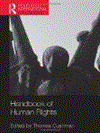

|
|
|
|
|
| Edition |
2nd ed.
|
| Publication |
Oxon, Routledge, 2012.
|
| Description |
xxiii, 744p.Hbk
|
| Standard Number |
9780415480239
|
|
|
|
|
|
|
|
|
|
|
|
Copies: C:1/I:0,R:1,Q:0
Circulation
| Accession# | Call# | Current Location | Status | Policy | Location |
| 057710 | 323/CUS 057710 | Main | On Shelf | Reference books | |
|
|
|
|
| 9 |
ID:
106536
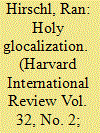

|
|
|
| 10 |
ID:
122449
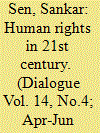

|
|
|
|
|
| Publication |
2013.
|
| Summary/Abstract |
Human rights have been described as those minimal rights that every
individual must have by virtue of his being a member of human family
irrespective of any other consideration. They are based upon mankind's
demand for a life in which the inherent dignity of a human being will
receive respect and consideration. These rights are essential liberties
taken for granted as the basis for a just and civilized society and are
not subjected to political bargaining or calculation of social interest.
The concept of human rights is old and rooted in history. From
ancient times to modern day human rights in various forms have been
the cultural heritage of all mankind. In 1968 as a part of the contribution
to International Human Rights Year, the UNESCO published a collection
of texts entitled "The Birth Right of Man" which illustrated the concept
of human rights from different cultural traditions and periods of history.
Ideology of human rights is thus not the exclusive product of Western
Europe.
|
|
|
|
|
|
|
|
|
|
|
|
|
|
|
|
| 11 |
ID:
120475
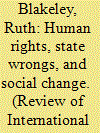

|
|
|
|
|
| Publication |
2013.
|
| Summary/Abstract |
This article demonstrates the significance of human rights for challenging state violence and terrorism. It is intended to enhance understanding of the concept of emancipation. Critical Security Studies has tended to focus on the individual as the agent of her/his own liberation. Yet many victims of oppression are not able to free themselves. Drawing on historical materialism, it is argued that collective agency on behalf of the oppressed has a necessary role to play in emancipatory politics. Emancipation is contingent on the capacity of specific agents, located socially and historically, to identify practices that might bring about change, structures that might be transformed, and appropriate agents that are in the best position to facilitate such change. This article shows how such collective social action has forced a reversal of some of the Bush administration's repressive policies, and has partially succeeded in curtailing the arbitrary use of US state power. This has been achieved through the national and international human rights architecture. Therefore, Marxian claims that human rights should be eschewed are mistaken, since they fail to acknowledge the emancipatory potential of human rights, the opportunities they provide for collective social action, and the role they can play in transformative social change.
|
|
|
|
|
|
|
|
|
|
|
|
|
|
|
|
| 12 |
ID:
176050
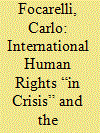

|
|
|
|
|
| Summary/Abstract |
A “crisis” of international human rights is under way. This article focuses on the “neoliberalism and human rights” debate. It argues that the current human rights crisis hinges on the evolution of neoliberalism as a “totalizing project”. A way out may be provided by the notion of the “human person” conceived as the individual in his/her uniqueness and complexity against any form of (market-induced or other) massification. The article concludes by suggesting that we place the (decommodified) human person, empathy, and school/education center stage.
|
|
|
|
|
|
|
|
|
|
|
|
|
|
|
|
| 13 |
ID:
141537


|
|
|
|
|
| Summary/Abstract |
This article presents Islamic women’s framing processes in their campaigns to address women’s political underrepresentation in Iran and Turkey. It argues that while Turkish women justify their claims through international human rights discourses, Iranian women frame their demands in religious terms to find resonance with political elites. Women’s strategic framing processes demonstrate the extent to which women’s demands for equal representation are shaped by the political and discursive opportunity structures that arise out of their secular or theocratic contexts
|
|
|
|
|
|
|
|
|
|
|
|
|
|
|
|
| 14 |
ID:
123232
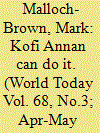

|
|
|
| 15 |
ID:
088668
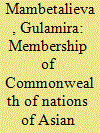

|
|
|
| 16 |
ID:
099894
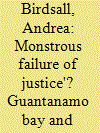

|
|
|
|
|
| Publication |
2010.
|
| Summary/Abstract |
This article considers challenges to the existing international human rights regime in the post-9/11 era. It uses an interdisciplinary approach that brings together issues of politics and law by focussing on international legal provisions and setting them into the context of International Relations theory. The article examines the establishment of Guantanamo Bay as a detention centre for suspected terrorists captured in the 'war on terror' and focuses on violations of international human rights and humanitarian law in the name of national security. This article demonstrates that the wrangling over Guantanamo Bay is an important illustration of the complex interaction between interests and norms as well as law and politics in US policy making. The starting point is that politics and law are linked and cannot be seen in isolation from each other; the question that then arises is what kind of politics law can maintain.
|
|
|
|
|
|
|
|
|
|
|
|
|
|
|
|
| 17 |
ID:
057586
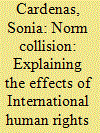

|
|
|
| 18 |
ID:
107683
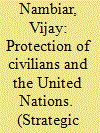

|
|
|
| 19 |
ID:
115599


|
|
|
|
|
| Publication |
2012.
|
| Summary/Abstract |
Although the humanitarian rationale for the use of force has gained legitimacy, the consensus around this legitimacy … has remained both narrow and fragile.
|
|
|
|
|
|
|
|
|
|
|
|
|
|
|
|
| 20 |
ID:
056469
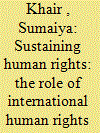

|
|
|